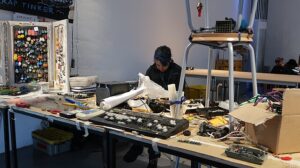This week’s guest blog comes from Dan Fernbank, Energy and Sustainability Manager at the University of Reading. Dan shares the sustainability progress made by the University of Reading in 2020, despite the myriad of challenges faced throughout the year. He then looks ahead to 2021, with a highly anticipated Net Zero Carbon Plan to be launched across the University.
Reflections on 2020
Last year was undoubtedly a turbulent year for higher education, the country and the world at large.
However, at the University of Reading this did result in some positive short-term reductions in our environmental impact. This included significantly reduced energy use and waste production as well as huge reductions in business and commuter travel. Although, due to PPE waste, on-site COVID testing facilities and the need for increased ventilation, there were also short-term negative environmental impacts.
Despite these challenges, we have continued to demonstrate strong progress on reducing our carbon emissions (44% below our 2008/09 baseline) and waste levels (17.6% per person below our 2015/16 baseline).
Overall, there has been much to learn from prioritising sustainability in response to a pandemic.
Looking ahead to 2021
2021 promises to be a big year for sustainability at Reading.
The University’s new Strategic Plan prioritises sustainability as one of its 4 Key Principles. At the heart of this will be a new Environmental Sustainability Strategy. This strategy will be broad ranging, covering our Net Zero Carbon Plan and other topics including:
- Biodiversity
- Campus Commerce
- Education for Sustainable Development
- Community and Civic Engagement
- Waste and Resource use
In uncertain times, we hope this strategy can bring a positive focus to the great sustainability work Reading already does and build on our achievements for the future.
Net Zero Carbon Plan
The University of Reading is a global leader in climate change research. We currently have the most lead authors in the upcoming 6th Assessment Report by the Intergovernmental Panel on Climate Change (IPCC). Not only do we have a deep understanding of the causes and impacts of global climate change, but also both a moral obligation and desire to lead by example on urgent climate action.
The A, B, C of Net Zero at University of Reading
We have a simple A, B, C ethos to underpin our Plan:
- All heating systems to be replaced – with low/zero carbon alternatives
- Better electrical energy – from energy efficiency, to renewable energy
- Capping and capturing business travel emissions – including carbon insetting/offsetting
Our Waste Strategy
We have seen a significant shift in attitudes towards waste and recycling over the last few years. There is a much greater understanding about the impact our individual actions have. We’ve also seeing the start of a significant shift to waste reduction and re-use over recycling. Our new 5-year Waste Strategy will continue this focus. It will take a nuanced approach to holistic waste management to ensure we embed genuine good practice throughout the University.
Jump and behaviour change at the University of Reading
The global COVID-19 pandemic has demonstrated more than ever how individual actions are crucial to tackling global problems.
This applies equally to sustainability and the environment, and individual action continues to be crucial to delivering lasting change. We have all experienced the benefits, and limitations, of home working, distance learning, video conferencing and the like. Our Jump platform has successfully adapted to support these actions and recognise their environmental benefits. We will continue to evolve to ensure that positive individual actions continue to be encouraged, recognised and rewarded as key contributors to our sustainability goals.
Final thoughts
2021 gives us the opportunity to build back better. We want to develop a sense of pride and also ownership of our new Environmental Sustainability Strategy and use this to galvanise positive action across the University.
Dan Fernbank, Energy and Sustainability Manager, University of Reading
Join our Jump community
The University of Reading is just one of the many higher education institutions working with Jump to deliver positive behaviours. In 2020, Jump universities completed a record-breaking 323,000 positive actions and avoided over 562,000 kg CO2e emissions..
Find out more about how Jump can engage your students and staff. Take a look at one of our case studies.
Want to know more? Get in touch with a member of our team for a 15 minute demo of our platform.








